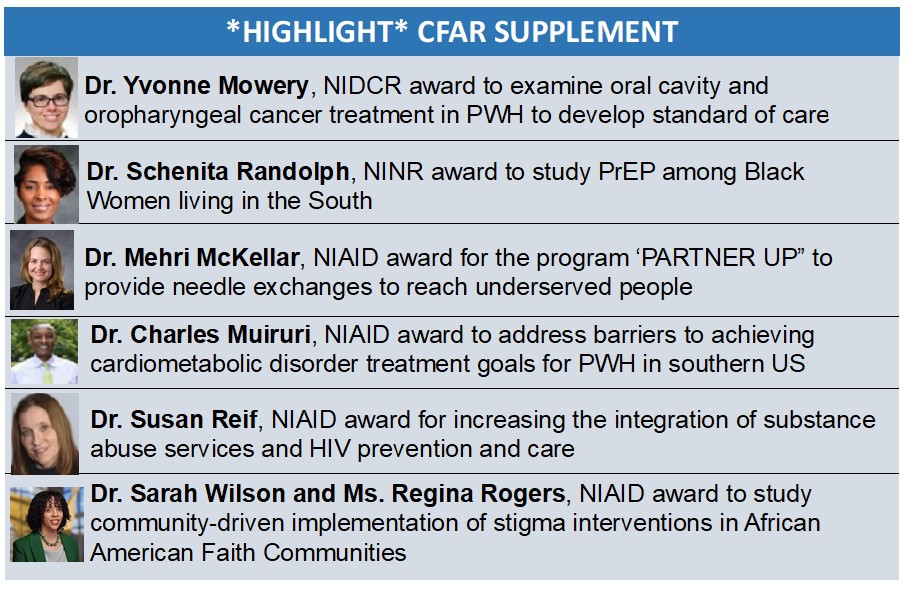Duke CFAR Microgrants
The CFAR Developmental Core Microgrants are one year awards that are intended to facilitate HIV/AIDS research by providing modest, but essential, resources that are not readily available from other sources. The Microgrant program is designed to support new NIH grant applications that will increase the HIV/AIDS funded research base at Duke.
There is no current Microgrant RFA. Please sign up for CFAR membership HERE to receive the latest funding information.
Duke CFAR Pilot Awards
The CFAR Developmental Core Pilot Awards support scientific studies for 1 year. The purpose of these awards is to develop preliminary data for peer-reviewed applications.
Proposals must target one of the NIH HIV/AIDS Priority Areas of Research.
Two types of Pilot Awards are available
- Standard Pilot Awards (7 pages) -- up to a maximum award of $100,000 direct funding
- Focused Pilot Awards (3 pages) -- up to a maximum award of $60,000 direct funding
Eligibility for CFAR Pilot Grant Awards
Faculty
- No prior R01 level funding in the HIV/AIDS field
- Applicants with prior R01 funding in other fields are encouraged to apply
Post-doctoral and Clinical fellows
- Applicants with a current K award must have NIH pre-approval
- T32 awardees cannot use CFAR award for training or stipends
- Separate letter of support from faculty mentor required, see Application information below
- PI Status must be submitted and obtained by department and approval document must be included in your CFAR pilot application.
*Questions on eligibility should be directed to the CFAR Developmental Core
CFAR Supplements
The Duke CFAR investigators have had great success in receiving CFAR supplements across a broad number of disciplines and NIH institutes, including National Institute of Nursing Research and National Institute of Dental and Craniofacial Research, among others. These supplements are summarized in the Highlight Box below.

Ending the HIV Epidemic (EHE)
| Investigator (Year) | EHE Supplement Grant Title |
|---|---|
| Meredith Clement/Amy Corneli 2019 | Getting to [NO]one in New Orleans: Enhancing PrEP Uptake in Black Women to End the Epidemic |
| Amy Corneli 2019 | PrEP-MECK: Identifying community-driven approaches for Increasing PrEP uptake, adherence, and persistence among Black men who have sex with men in Mecklenburg County, North Carolina |
| Amy Corneli 2020 | PrEP-MECK: Increasing PrEP uptake among Same Gender Loving Men in Mecklenburg County, North Carolina |
| Amy Corneli 2021 | EHE: Preparing for implementation of strategies to promote uptake of long-acting injectable PrEP among Black same gender loving men in HBCU communities |
| Sadie Wilson 2022 | Equity-focused implementation mapping to improve PrEP uptake and maintenance among Latines (Sub Site Latino AIDS Commission) |
| Lauren Brinkley Rubinstein 2023 | Evaluating the use of long-acting antiretroviral treatment for HIV during community re-entry: Addressing community and structural barriers |
| Charles Burns 2023 | Leveraging Southern Community-Based Pharmacies for PrEP Referrals |